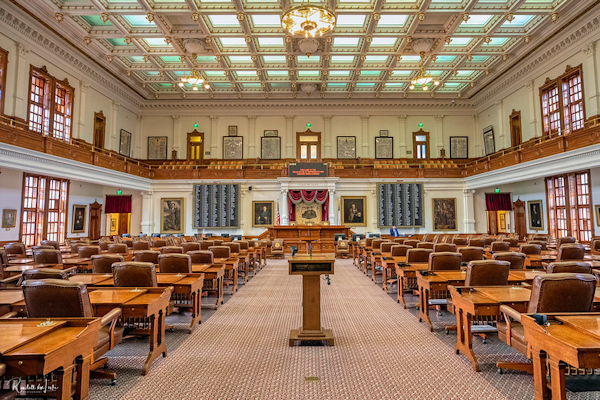SEJournal Online is the digital news magazine of the Society of Environmental Journalists. Learn more about SEJournal Online, including submission, subscription and advertising information.
 |
 |
| A powerful database can help environmental journalists track stories around the influence of lobbying money on energy and environmental policies. Above, the House of Representatives Chamber at the Texas State Capitol in Austin. Photo: Randy von Liski via Flickr Creative Commons (CC BY-NC-ND 2.0). |
Reporter’s Toolbox: Follow the Money … for Lobbying State Legislatures
By Joseph A. Davis
Perhaps you’ve abandoned all hope for the U.S. Congress. We won’t judge.
Environmental journalists will still find overlooked stories if they focus on state legislatures — and the money that motivates them. There are databases for that.
Remember, MAGA and conservative forces can credit a lot of their wins to their skill in influencing state legislatures. Through this influence, they have managed to dominate many issues nationwide — from abortion to drilling, agriculture and public lands.
The conservative, pro-industry
American Legislative Exchange Council
draws up model legislation ready
for state legislatures to adopt.
There is, for example, ALEC, the American Legislative Exchange Council. They are conservative and pro-industry. It draws up model legislation ready for state legislatures to adopt (which they often do). It has model policies, for example, on public lands, plastic production and toxic chemicals. A lot of its money comes from corporations.
Another example is the Koch network. The Koch family is very rich and their network of political influence organizations is too extensive to detail here. They are pro-oil and anti-regulation. Their best-known voice is the policy shop Americans for Prosperity. They have already earmarked millions for Trump’s plan to extend the tax cut for rich people and corporations. And yes, they would benefit from it.
Where the data comes from
Since the last Toolbox on this challenge, the handiest state-level data on state lobbying has been consolidated with our old friend OpenSecrets. Woohoo.
That is, the group formerly called Follow the Money (aka the National Institute on Money in Politics, which tracked state-level contributions) has merged with OpenSecrets (once better known as the Center for Responsive Politics).
Behind the latter is raw data, required by law to be submitted to the Federal Election Commission. Plus lots more data from other places.
The data in OpenSecrets is from
each of the states, virtually all
of which have individual laws
requiring it to be submitted.
The data in OpenSecrets is from each of the states, virtually all of which have individual laws requiring it to be submitted. Most states have some portal to their unique lobbying and contribution data.
The best place to start finding these portals is the site of the National Conference of State Legislatures.
It’s the best data you’ll get — although politicians and lobbyists are hardly the most scrupulous of sources.
Pick a state and try it out.
Using the data smartly
One of our favorite uses of this data is finding corruption. Don’t gasp.
State legislatures are even more vulnerable to corruption than Congress. One reason is that many states are dominated by a few powerful industries — whether oil in Texas, corn in Iowa, chicken in Maryland or mining in West Virginia.
Another reason is that many state legislatures are in session only a few months of the year, and may not pay legislators much. That means most legislators need to have day jobs as lawyers or whatever. Sometimes their clients may be selling chickens or oil.
Not all states are effective at preventing conflict of interest. Some of these people create loopholes for a living.
[Editor’s Note: For more on money’s influence in politics, see our Backgrounder on tracking environment-related contributions and an earlier Reporter’s Toolbox, “Climate Money Meets the Super PACs.” Plus, check out our Climate Solutions special report for a Tipsheet and Toolbox on reporting on corporations.]
Joseph A. Davis is a freelance writer/editor in Washington, D.C. who has been writing about the environment since 1976. He writes SEJournal Online's TipSheet, Reporter's Toolbox and Issue Backgrounder, and curates SEJ's weekday news headlines service EJToday and @EJTodayNews. Davis also directs SEJ's Freedom of Information Project and writes the WatchDog opinion column.
* From the weekly news magazine SEJournal Online, Vol. 10, No. 13. Content from each new issue of SEJournal Online is available to the public via the SEJournal Online main page. Subscribe to the e-newsletter here. And see past issues of the SEJournal archived here.













 Advertisement
Advertisement 



